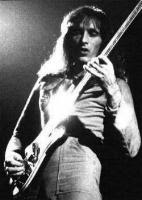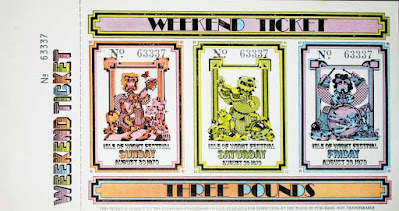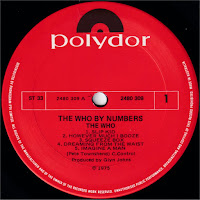Before things get too serious here at Rock On Vinyl, I thought it might be fun to post a song / album at the end of each month, that could be categorized as being either Weird, Obscure, Crazy or just plain Korny.
Goldie Hawn is an American actress who rose to fame on the NBC sketch comedy program Rowan & Martin's Laugh-In (1968–1970), before going on to receive the Academy Award and Golden Globe Award for Best Supporting Actress for her performance in Cactus Flower (1969). She later appeared in a string of successful films during the 70's, 80's and 90's - but my favourite is her starring role with Kurt Russell (who she later married) in the 1987 Comedy 'Overboard'.My first recollections of seeing her on T.V was watching her Go Go Dancing on Laugh In. Being an impressionable and young hormonal teenager at the time, her skimpy bikini and body paint was the highlight of the show, and it was 'lust at first sight'.
And then later, what a hidden talent - who would have guessed that Goldie could sing?
In 1972, Reprise Records released a country album from Goldie Hawn. The album is country tinged folk pop (Buck Owen's band The Buckaroos play on a few tracks (I'll Be Your Baby Tonight), rounded out by session musicians.)
And Now For Something Weird
Goldie Hawn has recalled being "touched" by aliens.
The 77-year-old Hollywood star suddenly remembered hearing a "high pitched sound" outside of her window and claimed that a few extraterrestrial beings came forward to feel her face in a move she likened to being touched by God.
Speaking on Apple+ 'Time to Walk' audio experience, she said: “It was kind of like regression therapy or something. I am, like, almost in a trance. And suddenly I remembered something.
"They touched my face, and it felt like the finger of God. I got this high-pitched sound in my ear. It was this high, high frequency. And I looked out the window, and I saw these two or three triangular-shaped heads. It was the most benevolent, loving feeling. This was powerful. It was filled with light."[Extract from The Daily Sentinel]
In 1972, Reprise Records released a country album from Goldie Hawn. The album is country tinged folk pop (Buck Owen's band The Buckaroos play on a few tracks (I'll Be Your Baby Tonight), rounded out by session musicians.)
Review by Stewart Mason (AllMusic Review)
It's a tragedy of pop culture in the new millennium that starlets don't rush willy-nilly into the recording studio anywhere near as much as they used to. Goldie Hawn's sole foray into pop music -- originally released in 1972 on Warner Bros. after Laugh-In but before her appearance in Steven Spielberg's Sugarland Express revealed her dramatic range as an actress -- isn't Golden Throats-level bad, surely to the disappointment of hipsters everywhere. Although Hawn's helium-pitched voice is a trifle thin and limited, the selection of material wisely plays to her strengths, with Dolly Parton's "My Blue Tears" and -- believe it or not -- Joni Mitchell's "Carey" both well-suited to her soprano vocals.
In fact, the only really egregious errors aren't really her fault: the Frenchified "Butterfly," with its absurdly cheesy choral backing, wouldn't have sounded good sung by anybody, and the countrified take on Van Morrison's "I Wanna Roo You" has a botched arrangement that slaps on a vaguely oompah-style waltz-time arrangement that suits neither singer nor song. Other than that, though, Goldie is a sweetly endearing country-tinged middle of the road pop record of a style that just isn't being made anymore.
Sidenote: "Golden Throats 3, Sweethearts of Rodeo Drive" was the third Golden Throats collection released by Rhino, this time featuring clueless celebrities warbling country songs. The cover image was based on the cover of the Byrd's country-rock album "Sweetheart of the Rodeo", and features Goldie Hawn sporting her Laugh-In tattoos.
Goldie Hawn has recalled being "touched" by aliens.
The 77-year-old Hollywood star suddenly remembered hearing a "high pitched sound" outside of her window and claimed that a few extraterrestrial beings came forward to feel her face in a move she likened to being touched by God.
Speaking on Apple+ 'Time to Walk' audio experience, she said: “It was kind of like regression therapy or something. I am, like, almost in a trance. And suddenly I remembered something.
"They touched my face, and it felt like the finger of God. I got this high-pitched sound in my ear. It was this high, high frequency. And I looked out the window, and I saw these two or three triangular-shaped heads. It was the most benevolent, loving feeling. This was powerful. It was filled with light."[Extract from The Daily Sentinel]
This month's WOCK on Vinyl post started off fitting into the Obscure box (thanks to Tony Angel for this rare rip) however after reading the above article from The Daily Sentinel, I've decided to tick the Weird Box as well. I'm starting to think that Goldie may have been using more than paint with her body during her 'Laugh In Days' - but then, didn't we all? Say no more. Hope you enjoy her album. Ripped to MP3 (320kps) and includes album artwork.
Track List
A1 - My Blue Tears 2:14
Written-By – Dolly Parton
A2 - Wynken, Blynken And Nod 2:32
Written-By – Donovan Leitch, Eugene Field
A3 - Butterfly 3:20
Written-By – Danyel Gérard
A4 - Uncle Pen 2:40
Written-By – Bill Monroe
A5 - The House Song 4:02
Written-By – Paul Stookey, Robert Bannard
A6 - I'll Be Your Baby Tonight 3:00
Written-By – Bob Dylan
B1 - Carey 2:46
Written-By – Joni Mitchell
Written-By – Travis Edmonson
B3 - Ring Bell 3:00
Written-By – George David Weiss, Jerry Ragovoy
B4 - I Wanna Woo You 2:30
Written-By – Van Morrison
B5 - Pasadena 2:45
Written-By – Edgar Leslie, Grant Clarke, Harry Warren
Goldie Link (83Mb)



































































.jpg)


